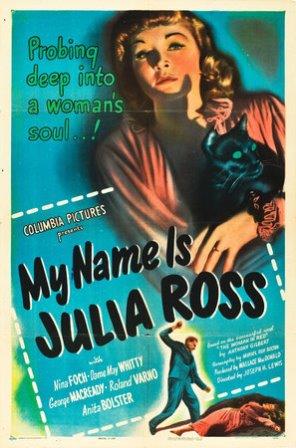She went to sleep a secretary . . . and woke up a madman’s bride!
In the simple premise of My Name Is Julia Ross, a young secretary, having acquired a new job, awakens in a strange house and is told by her “husband” that she is someone else. Once the nondescript title is put aside and despite the clichés of the isolated sea coast mansion, the locked room, a secret passage, a black cat and the woman’s continued failures to escape, the film evolves into a tight little crime drama, film noir, mystery and, most obviously, a woman-in-distress exercise.
Nina Foch as the title character heads the cast and rightly so. Hardly recognizable as the Nina Foch of later years, she is totally convincing as the sometimes frightened, sometimes distraught Julia. It is one of her best roles, registering the requisite fear and, underneath, the tenacity to survive—no hysterics, just a contained inner terror that, to the viewer, is palatable. The part comes early in a long career usually limited to secondary parts and, later, appearances in TV series, as a game show panelist and director of plays.
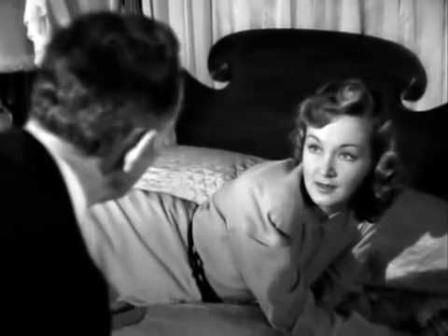 She is admirably supported by two popular players of normally contrasting personas but here merged for a joint evil. Dame May Whitty, either an autocratic grandmother (Mrs. Miniver, 1944) or a harmless busybody (Gaslight, 1942) or the nice old lady who disappears (The Lady Vanishes,1938), is now a dastardly mother helping to conceal a son’s crime. She goes about her task with subtle cruelty.
She is admirably supported by two popular players of normally contrasting personas but here merged for a joint evil. Dame May Whitty, either an autocratic grandmother (Mrs. Miniver, 1944) or a harmless busybody (Gaslight, 1942) or the nice old lady who disappears (The Lady Vanishes,1938), is now a dastardly mother helping to conceal a son’s crime. She goes about her task with subtle cruelty.
And the son? None other than George Macready, that resident scar-faced villain (a real scar, sustained in a car accident), usually as an urbane, cultured-voiced criminal (best as such in Gilda, 1946). In Julia Ross he plays his part with nuanced shifts from the glazed stare of insanity—always hacking at things with a knife—to the debonair “husband” concerned only for Julia’s, er, Marion’s best interests.
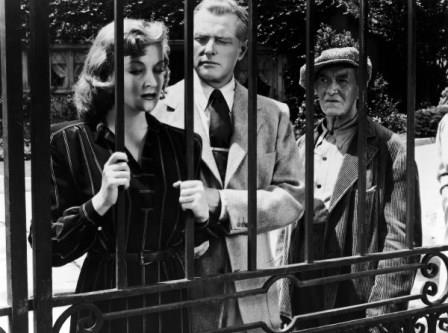 The stars are well supported by a number of reliable Brits. Queenie Leonard as Alice the maid, the only person not in on the sinister plot against poor Julia, has frequently been cast as maids—in Forever and a Day (1943), The Lodger (1944), And Then There Were None (1945) and Les Misérables (1952).
The stars are well supported by a number of reliable Brits. Queenie Leonard as Alice the maid, the only person not in on the sinister plot against poor Julia, has frequently been cast as maids—in Forever and a Day (1943), The Lodger (1944), And Then There Were None (1945) and Les Misérables (1952).
Often seen as annoying, indifferent or uncaring characters, and so she is here, Anita Bolster has an angular, long-nosed face which recalls Margaret Hamilton’s. To see her is to remember her! Her films include Saboteur (1942), The Thin Man Goes Home (1945), The Picture of Dorian Gray (1945) and The Two Mrs. Carrolls(1947).
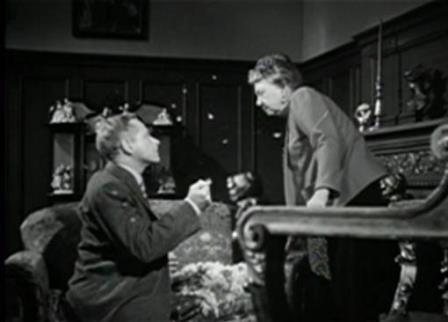 Leonard Mudie, also in on the scheme, has played other unflattering roles: the cruel, dying Chief Judge Baron Jeffreys in Captain Blood (1935) and, another judge, the Grand Inquisitor deciding the fate of mankind in The Story of Mankind (1957). He spent the last ten years of his career in television, playing bit parts in numerous series, including four episodes of The Adventures of Superman (1953-56).
Leonard Mudie, also in on the scheme, has played other unflattering roles: the cruel, dying Chief Judge Baron Jeffreys in Captain Blood (1935) and, another judge, the Grand Inquisitor deciding the fate of mankind in The Story of Mankind (1957). He spent the last ten years of his career in television, playing bit parts in numerous series, including four episodes of The Adventures of Superman (1953-56).
Making far more films than any of his supporting co-stars, and by far the least familiar, Olaf Hytten appeared in five of Universal’s Sherlock Holmes mysteries and in twenty films in 1939 alone. His brief roles are easily overlooked: a judicial clerk in The Black Swan (1942), a pickpocket victim in Casablanca (1942) and a king in Against All Flags (1952).
Julia Ross (Foch), unemployed, finds a job rather easily at one agency. She tells the secretary, Mrs. Sparkes (Bolster), that she has no living relatives or romantic attachments, neglecting to mention her boyfriend Dennis (Roland Varno). Mrs. Sparkes believes her ideal and calls the wealthy widow, Mrs. Hughes (Whitty).
Mrs. Hughes approves and insists that Julia move into her mansion that night. The employment agency is immediately closed, as its sole purpose was to find the one young girl who met the “requirements”—that is, as the unfolding plot will reveal, someone unlikely to be missed.
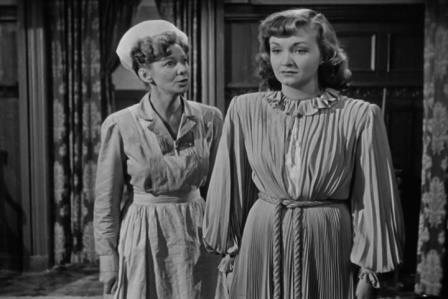 When Julia awakens the next morning, her purse and luggage are gone, she’s wearing a gown with the initials “MH” and the door is locked. Mrs. Hughes’ son Ralph (Macready) says she is his wife, Marion Hughes. Mother and son fake a show of benevolence toward Julia, consoling her after her “nervous breakdown.” They tell the maid Alice and the rest of the staff that Julia’s outrageous claims are caused by her condition.
When Julia awakens the next morning, her purse and luggage are gone, she’s wearing a gown with the initials “MH” and the door is locked. Mrs. Hughes’ son Ralph (Macready) says she is his wife, Marion Hughes. Mother and son fake a show of benevolence toward Julia, consoling her after her “nervous breakdown.” They tell the maid Alice and the rest of the staff that Julia’s outrageous claims are caused by her condition.
Julia makes several attempts to escape, but is always thwarted. Once, when prevented from leaving by the gatekeeper (Charles McNaughton), she scribbles a note, attaches it to a rock and throws it between the pickets of the iron gate.
When three people arrive, including a Reverend Lewis (Hytten), Julia mistakenly assumes they have found her note, but when she tells them she’s being held prisoner, Mrs. Hughes deftly convinces the visitors of her daughter-in-law’s mental instability.
Later, Julia writes a letter to Dennis and leaves it where the Hughes are sure to find it. Sure enough, after the mother has substituted a blank sheet of paper, Julia writers another letter that the Hughes, unaware, allow her to mail on a visit to the local village, accompanied by the watchful Ralph.
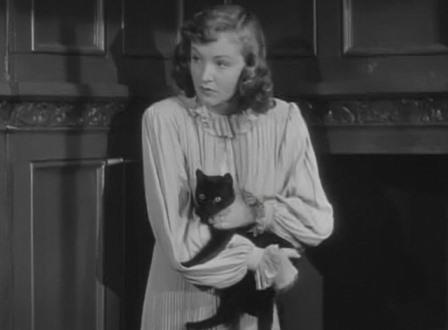 When she inexplicably finds a black cat in her room, she figures there must be a secret passage—and finds one. While hiding inside the wall space, she witnesses a scene between Ralph and his mother. The son has killed his wife, the body presumably disposed of. Julia, now established as his wife, is to take her place and die of nature causes. Ralph, in a fit of psychotic rage, tears into a sofa cushion with his knife, but his mother stares him down.
When she inexplicably finds a black cat in her room, she figures there must be a secret passage—and finds one. While hiding inside the wall space, she witnesses a scene between Ralph and his mother. The son has killed his wife, the body presumably disposed of. Julia, now established as his wife, is to take her place and die of nature causes. Ralph, in a fit of psychotic rage, tears into a sofa cushion with his knife, but his mother stares him down.
Next, Julia uses a bottle of poison she finds to fake a suicide attempt. When a doctor Peters (Mudie) arrives, she tells him her plight, including about the letter, only to discover that he isn’t a doctor but in on the plot.
While Peters is dispatched to London to intercept the letter, a real doctor (Evan Thomas) arrives and says Julia must go to a hospital, but Mrs. Hughes persuades him to come back in the morning.
Fearing her time is running out, Julia throws her gown out her high-story window, onto the seaside rocks below and hides in the secret passage. While Ralph, assuming another suicide attempt, races down to the beach to make sure she’s dead, she beats him down, posing as her own dead body. By this time Dennis and the police have arrived, alerted when Peters is caught with the letter. Ralph raises a rock to finish off Julia, but Dennis stops him, and when Ralph flees through the surf, the police shoot him down.
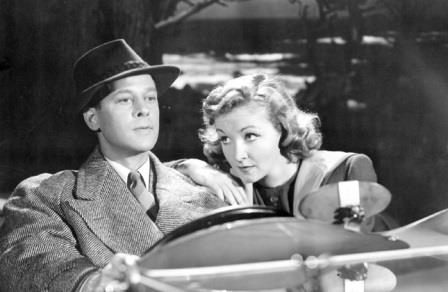 Dennis proposes to Julia as they drive away.
Dennis proposes to Julia as they drive away.
The effectiveness of the atmospheric score is surprising. Not the unified work of one creative mind, though it gives that impression, the music is a collection of stock material by a number of composers. Among them are three who fled the Nazis in the 1930s: Ernst Toch, a classically trained Viennese composer; Mario Castelnuovo-Tedesco, who did receive sole credit for And Then There Were None; and Friedrich Hollander, a Berlin cabaret song composer who received four Oscar nominations, one for “This Is the Moment” from The Lady in Ermine (1948).
The viewer might sense that My Name Is Julia Ross fails in at least one respect, that never for a moment does Julia doubt her identity—or maybe that’s a strength, since the villains must work all the harder to deceive her. And from the opposite perspective, those same viewers never, in any of their own private moments, doubt that this woman is Julia Ross.
[embedyt] https://www.youtube.com/watch?v=x26RC_gJ80s[/embedyt]
